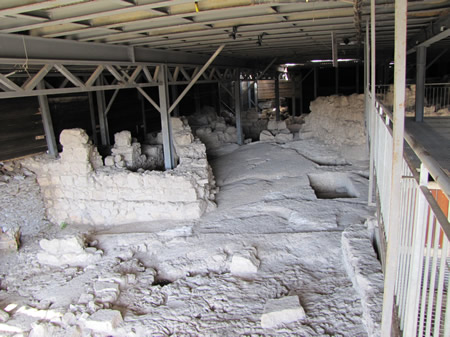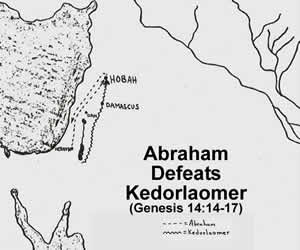| |

|
January 24 - Evening
"The Lord said to Moses, “Tell Aaron,
‘Take your staff and stretch out your hand over the waters of Egypt—over the streams and canals, over the ponds and all the reservoirs—and they will turn to blood.’ Blood will be everywhere in Egypt, even in vessels of wood and stone.”
- Exodus 7:19 |
 |
|
| Chaos Comes to Pharaoh's Ma'at |
|
|
The Nile flooded in July/August to refresh the soil with fresh deposits and moisture for the growing season. A series of ceremonies officiated by Pharaoh would be held at the Nile to encourage this flooding process in order to give Egypt an abundance of crops and economic prosperity. Pharaoh was responsible to maintain ma’at (see details here), which was the universal order of the physical and moral world. In Egypt all order began with the Nile and the gods all worked to maintain ma’at in Egypt.
Yahweh’s first attack on Egypt was a matter of national security when he visited the Nile with chaos by undoing ma'at. After having shown Aaron’s staff becoming a monster of chaos that devoured the magician’s staffs in Pharaoh’s court, God now loosens his hold on the order his creative work in Egypt. The Egyptian gods can do nothing to stop or reverse the process. The gods cannot restore order. Yahweh begins unleashing the forces of chaos and upsets ma’at in Egypt when he strikes the Nile River.
Pharaoh had failed to recognize the true God, the Sovereign Creator and Judge, who called himself Yahweh. Moses had provided words and demonstrations to reveal and confirm the desires and plans of Yahweh, yet Pharaoh refused to concede the portion of the Egyptian kingdom that God called his own: the Hebrew people. Instead, Pharaoh refused to recognize God’s authority and power, and chose to exalt his own self as a deity, the keeper of ma'at, and the master of the deities.
Now, it was time to confront Pharaoh’s claims and force God’s will. The source of the life of Egypt, the Nile River, would be struck. This attack on Egypt would reflect poorly on a variety of Egyptian gods: Khnum, god of the Nile's flooding; Hapi, the god of the Nile; Osiris, the god of the earth and vegetation; Osiris, the god whose blood was the water of the Nile and his blood stream was the Nile itself.
Pharaoh’s disobedience to Yahweh’s demand results in disorder, death and discomfort. The striking of the Nile River was a serious and comprehensive blow by Yahweh to Pharaoh’s kingdom and authority, but far from the distress, destruction and death that could be avoided in the future if Pharaoh would humble himself to Yahweh’s request to give Yahweh the people of Abraham.
It is interesting to note that the Lord asked only for his people. He did not ask for a temple in Egypt. He did not ask for a national revival in Egypt. He did not ask Pharaoh or the people to forsake their gods. The Lord simply asked for his people, but Pharaoh would not recognize the Lords absolute authority which made this request very, very reasonable considering Yahweh could have asked for much, much more. |
|
 |
"The problem with a living sacrifice is that it keeps crawling off the altar."
|
 |
The first hymn in the English language designed for public worship was written by Isaac Watts in 1688. Up until this time the only singing in the church was of the Psalms, but Isaac argued with his father that limited singing of only Psalms resulted in the omission of singing the great New Testament truths. Soon, the church agreed to this new practice (1,650 years after the resurrection), and Isaac began to write a new hymn each week. |
|
| |
 |
|
 |
Laodikea (Gr) - Laodicea (Eng) – Laodikea is a Greek compound word for the name of a city in Asia. Laodikea is made of laos that means “people” and dike which can mean “custom,” “right,”
“a lawsuit,” “a judicial decision (especially a guilty verdict),” “execution of a sentence,”
“avenging justice.” Together laos and dike make Laodikea mean “a judicial decision of the people,” “execution of a sentence by the people,” “the people’s right,” “the custom of the people,”
“the people’s lawsuit,” or, simply, “the people rule.” |
|
First Kings 4:26 says “Solomon had four thousand stalls for chariot horses, and twelve thousand horses.” Second Chronicles 9:25 says the same thing, but adds “…which he kept in the chariot cities and also with him in Jerusalem.” One of those “chariot cities” has been identified as Megiddo where Solomon’s stables and the mangers have been found. (details here) |
| |
|
|
 |
|
 |
Do understand that following God's will and being obedient to his Word will provide order and stability?
I will avoid the chaos and confusion of the world by hearing the truth and walking in its light.
|
|
"By wisdom a house is built,
and through understanding it is established;
through knowledge its
rooms are filled
with rare and beautiful treasures."
- Proverbs 24:3-4 |
| |
|
|
|
|
| |
|
 |
 |
 |
 |
| Parents |
Maturity in understanding and life |
Secretary of Education |
Immigrant communities: Chinese, Japanese, Muslims |
|
|
| |
 |
 |
 |
 |
Inside David's palace in Jerusalem. This is the remains of a large stone structure that served as a governmental building during the days of David, Solomon and the kings of Judah, and, also, after the return from exile. This is residence of King David and the kings of Judah.
(More details and photos here.) (click on image for larger size) |
A map of Genesis 14 detailing Abraham's attack and defeat of the four kings from the East. (click on image for larger size) |
| |
|
| Details and Explanation of Sets & Reps Devotional System Here |
 |
|
|
| |
| |
| |
| Reps & Sets is a daily Bible devotional for Christians from Generation Word Bible Teaching used each morning and evening. |
| |
|